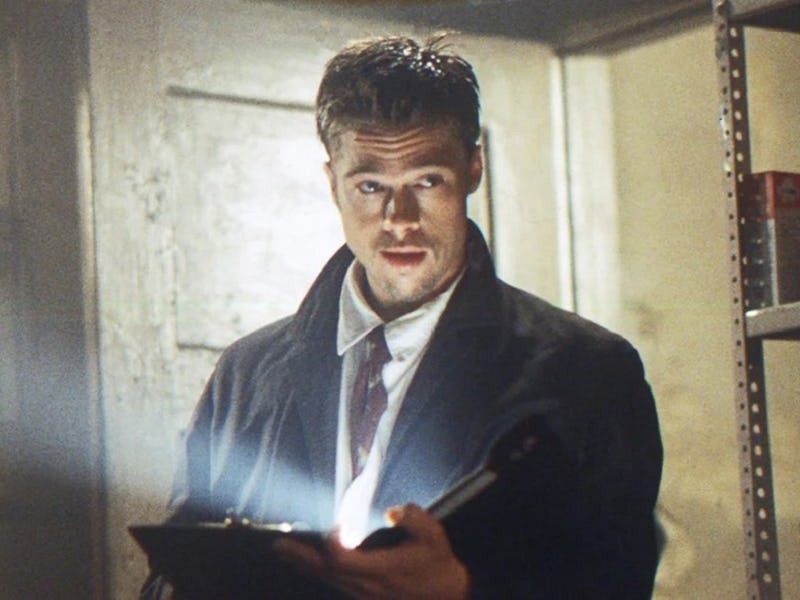Se7en Remains a Thrilling and Unflinching Statement of Intent From David Fincher
If you still haven’t found out what’s in the box, now’s as good a time as any.

The crime genre offers filmmakers the chance to explore many facets of life. Chinatown and L.A. Confidential, for instance, are as much explorations of moral and political corruption as they are pulp detective stories. Fargo and No Country for Old Men double as both intense crime thrillers and examinations of the slow decay of decency.
Few crime movies have ever confronted their own ideas about the state of the world as explicitly as Se7en. Directed by The Social Network and Zodiac filmmaker David Fincher, Se7en is the rare kind of thriller that feels like it belongs to both the detective and horror genres. 28 years after its release, it’s well-remembered for how it helped launch both Fincher and Brad Pitt’s careers, and how unhesitatingly yet unpredictably it dives into the darkest corners of its own story.
Set in an unnamed and perpetually rain-soaked city, Se7en follows William Somerset (Morgan Freeman), a longtime police detective who’s grown disillusioned by the state of the world and the slow, ceaseless march of evil. He finds himself partnered up with the more impulsive, less pessimistic David Mills (Brad Pitt) on an investigation into a series of shockingly grotesque murders. Not long into their investigation, Somerset realizes the murders are meant to evoke the seven deadly sins.
He and Mills become obsessed with tracking and stopping Se7en’s mysterious criminal before he can finish his ritualistic murders. Unfortunately for them, Se7en exists in a world where corruption is not only pervasive, but where everyone’s moral convictions are frequently and brutally tested on a regular basis. Their investigation changes Mills and Somerset in ways neither is prepared for.
To say much more would remove much of the film’s power. Its third act is iconic, and not just because of how thrilling it is. Se7en ultimately isn’t interested in providing its viewers with any sense of catharsis. Instead, it mines its power from just how aggressively it tries and, eventually, succeeds at breaking down its heroes. To call it uncompromising would be an understatement.
Morgan Freeman and Brad Pitt play a profoundly incompatible detective duo in David Fincher’s Seven.
Visually, Fincher and cinematographer Darius Khondji reflect the dour mindset of Freeman’s Somerset by bringing to life a city that’s been robbed of whatever colorful vibrancy it once might have had. Se7en’s world looks so grimy and hopeless that Somerset’s disillusionment becomes infectious, which just makes his sudden, naive desperation to stop the film’s brutal finale all the more devastating.
The film doesn’t just succeed on a visual or intellectual basis, but as an emotionally engaging exploration of the universal battle we all face against nihilism and apathy. And while doing so, Se7en takes more unexpected turns than anyone checking it out for the first time could possibly see coming, including a series of third-act twists that put the film’s heroes and viewers on their back foot for the final 30 minutes.
Se7en then pulls off an unexpected feat. It reignites its hero’s belief in humanity not by letting him win, but by hitting him and his partner with a series of defeats that are so shattering they remind him of just how much we all stand to lose if we give into hopelessness. It manages to both honor and reject the dismal perspective of many of its crime movie predecessors, and it does so in a truly unpredictable fashion.
Se7en is streaming on HBO Max until Sunday, April 30.